Countryside: Who really has access to the great outdoors?
- Published
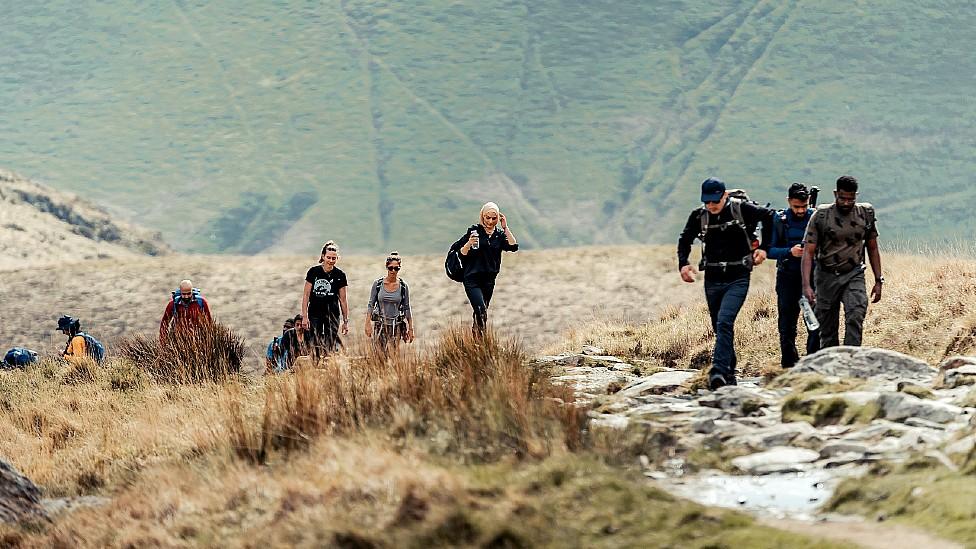
Muslim Hikers on their way up Cader Idris in Snowdonia
When was the last time you went for a walk in the countryside?
Perhaps you stuck your hiking boots on, grabbed a waterproof (this is Britain...) and jumped in the car at the weekend for a few hours of fresh air and glorious landscapes.
But what if you don't have a car? Or hiking boots? Or even a suitable coat? What if you don't have the money to buy a bus ticket or there aren't any buses where you live?
Maybe you're disabled. Maybe you don't see any people who look like you in the countryside and don't feel you fit in.
For sections of the population, the countryside is not a place they can access or feel comfortable in.
Haroon Mota is doing his best to change that for people in the Muslim community.
A lover of the outdoors, the former charity events organiser noticed he rarely saw other people "looking like me", as he puts it, when he was out walking and wanted to do something to change that.
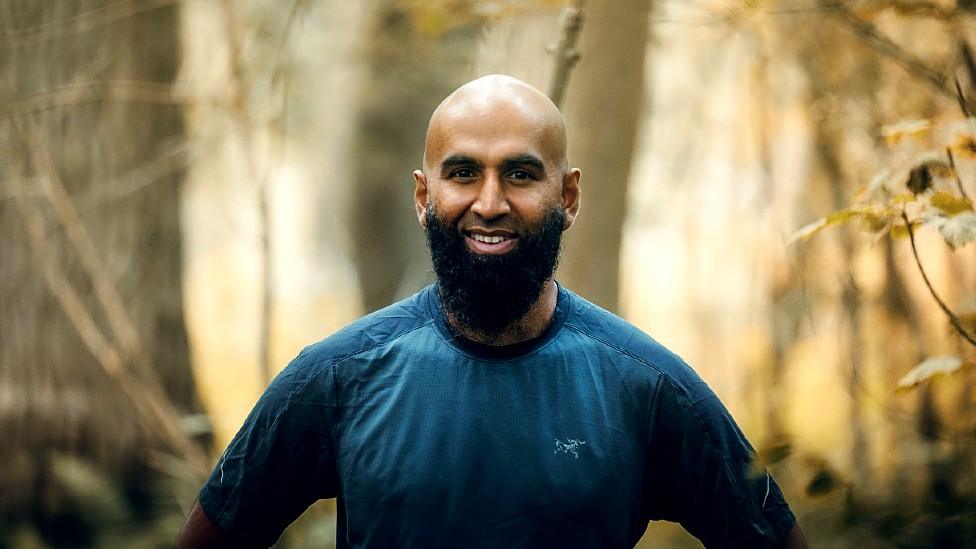
Haroon Mota founded Muslim Hikers to encourage more people "who looked like me" to go country walking
When the pandemic began, he started the Instagram group Muslim Hikers, external "just for the sake of sharing positive vibes and encouraging people to get outside more".
"There was plenty of documented cases of loneliness and isolation and I wanted to address that and share stories of positive role models… just to try and normalise being outdoors for our communities which evidently isn't quite the norm and why such under-representation exists."
The page "blew up" and people were "flocking to our page", not just from the UK but globally.
"My favourite place to hike is Snowdon, so our first hike was up Snowdon in July just last year," he said.
"We had 80 people from across the UK who'd travelled to join us for our first hike and it was just beautiful, especially having just emerged from the pandemic and seeing all of these online people by their Instagram names. seeing them for real, like 'oh yeah, you're that Hijabi Hiker on Instagram and you're Brother Mountain Beard' and all these funny Instagram names."
The group's monthly hikes attract up to 150 people and they visit national parks across the UK, including one at Cadair Idris and a second Snowdon hike last month.
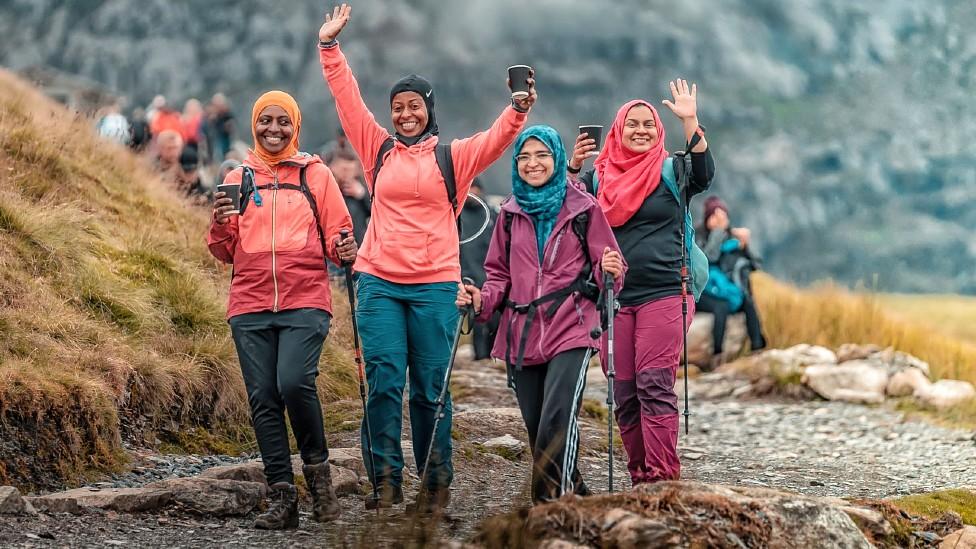
A group of women on the first ever Muslim Hikers trek up Snowdon in 2021
"In terms of reception [in Wales], when we're outdoors the people we meet are always pleasant. People are keen to know who are this big group of people and why are we here, and people love what we're doing."
But it's not just the organised hikes that are the point of Muslim Hikers and Active Inclusion Network, external, the community interest company he now runs to promote getting outdoors to diverse audiences.
"The idea is to empower them so that they have the awareness and confidence to be able to do this independently, whether that's solo travel or coming back with their friends or their family.
"We see [from social media] that people who have met on our hikes are then going on to do their own hikes in smaller friend circles which is always nice to see."
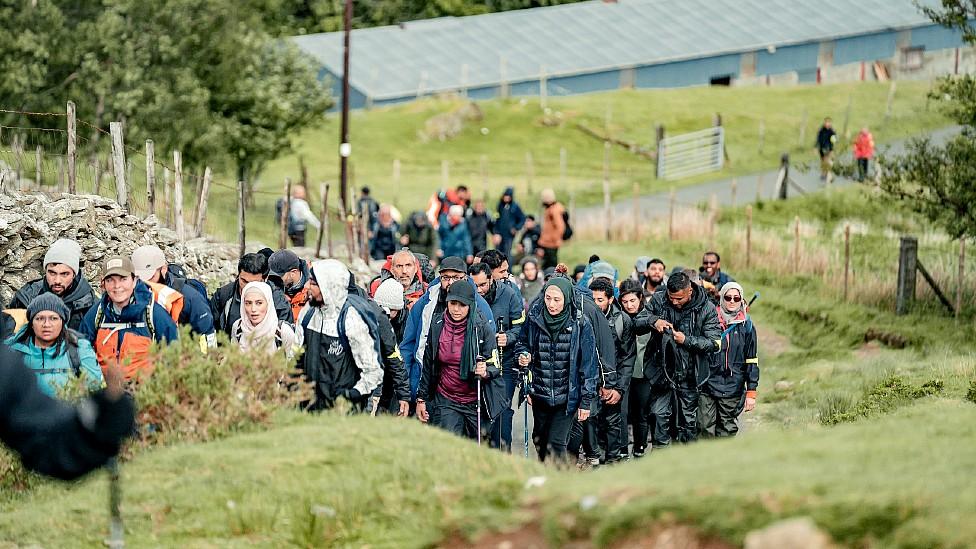
Many more followed in their footsteps this June for the second Snowdon hike
Haroon has faced questions about why the group is called Muslim Hikers and whether faith matters in this context.
"I think it's got everything to do with it," he said.
"Under-representation exists, barriers exist, these are real problems and issues and I think we are tackling it head-on."
He said many people attending the hikes were visiting a national park for the first time and it was easier being in a supportive environment with other newcomers.
"We want to facilitate and nurture relationships with these national parks so that people can see these as places where they feel comfortable and happy, where they feel safe and where they feel that they can belong."
A 2018 report, external from the Welsh government establishing priorities for Wales' national parks and areas of outstanding natural beauty (AONBs) highlighted another section of society which needed help with countryside access.
It said: "While it is important for all sectors of society to experience these designated landscapes, particular focus should be given to children and young families from deprived areas. Action must be taken to help to tackle the inequalities that exist in health, education and economic outcomes amongst the poorest in society."
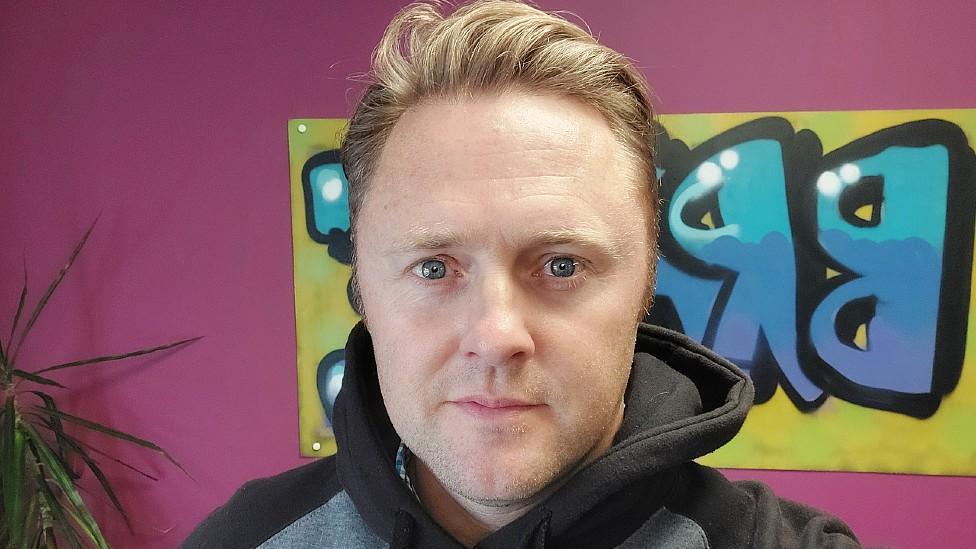
A keen walker, Darren Bartley tries to give the same experience to the young people he works with
'They get things off their chest'
Down in south Wales, Darren Bartley devotes large parts of his working life to trying to realise this ambition and foster a similar relationship with the countryside for young people who, through social background, have fewer chances of experiencing it.
As an engagement and participant officer for children's services at Neath Port Talbot council, he has set up a number of groups for young people who have been in care or receive other kinds of support.
Two of them, Hope, a girls' rights group, and a young person's panel called Youth Voice Matters, are taking part in an outdoor festival called Green Spaces, Dark Skies, external, which is designed to encourage diverse groups of people to experience the natural environment, particularly those who might not be frequent visitors.
It is running a series of outdoor events across the UK, with three in Wales in Gower, the Brecon Beacons and Anglesey.
The events take place as darkness is falling and all participants carry specially designed low-emission torches which are used to create a filmed light and sound experience.
Darren, a keen walker, said spending time in the natural environment for the young people he worked with did wonders for their mental health.
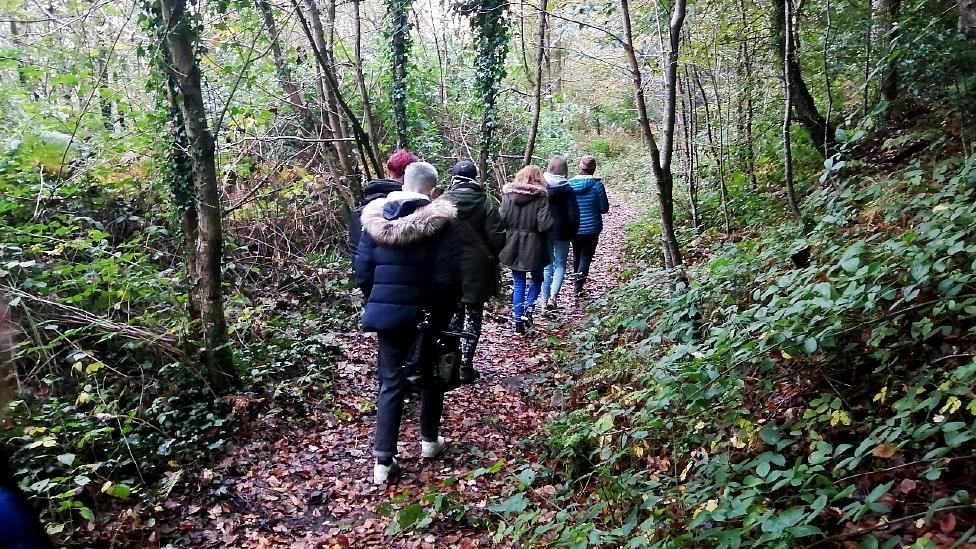
Nature "is like a magic pill" for helping young people with their mental health, Darren says
"A lot of the children I work with are incredibly vulnerable or have had difficult backgrounds, hence a lot are in care. They don't always get to access the outdoors and the benefits that I know, and pass on to my own children.
"If you were to look at their personal lives, unless these things were put on, and buses put on and everything spoon-fed to some of the families, they would never go to a country park," he said.
"There's lots of outdoor spaces of natural beauty in Neath Port Talbot and they're on the doorstep for many of these communities but [the young people] never get to go to them.
"It definitely empowers them. It's a huge effort for them to try something new, to go to the Beacons or the coast, it's really out of their comfort zone... but for this group they're starting to value the fun things that are on and can be done in the parks and nature.
"There must be millions and millions poured into throwing medication at people's mental health problems but that could just be [put into] proper transport links to these places, which would have a far more profound effect on families and their relationships, and having fun and their mental health and well-being.
"Transport is a huge issue, especially in somewhere like Neath Port Talbot because you have all these valleys and everything's a drama to get to. It's not as straightforward as if you live in a city for example."
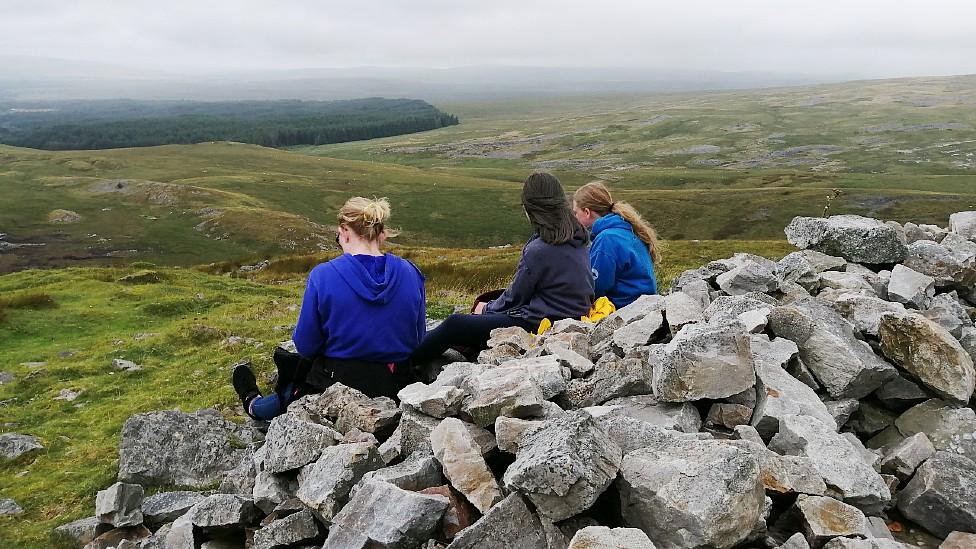
Giving young people from deprived areas access to the national parks is a Welsh government priority
His group has just secured some funding which they hope to use to bulk-buy walking gear for the children so they cannot "make it an excuse for not coming".
"I must have a fortune's worth of kit in my wardrobe because I can go out in all weathers - some of these children don't even have the proper coat to go to school in, let alone go to the Brecon Beacons in."
Getting out on walks "in the middle of nowhere" also gave the young people the opportunity to talk.
"They get things off their chest," Darren said.
"You just walk alongside someone for five minutes and they do offload a little bit or you get to know them a little bit better. It just builds more of a relationship up, from a professional point of view."
'Everyone should experience the wild'
Having access to transport is a key issue for the people who come along to the Healthy Lives project in Brecon, Powys, part of BCA advocacy services for people with learning disabilities, where project coordinator Catherine Povey works.
Like the children from south Wales, members of the group have been participating in the Green Spaces, Dark Skies events, and took part in preparatory workshops involving creating recordings, poetry and willow weaving.
The group generally did a "lot of going outdoors", Catherine said, adding: "We went and did a bit of forest bathing the other day. We had a very slow walk so people who were less physically able came along and we took our time.
"People started stopping and closing their eyes and just saying, 'listen to the birds, I live in the town now, this is just so peaceful'. People started stroking trees, somebody started sniffing things and saying, 'smell this' - it was total immersion.
"People walk and talk - that's a big thing, I think. It's a big social for everybody."
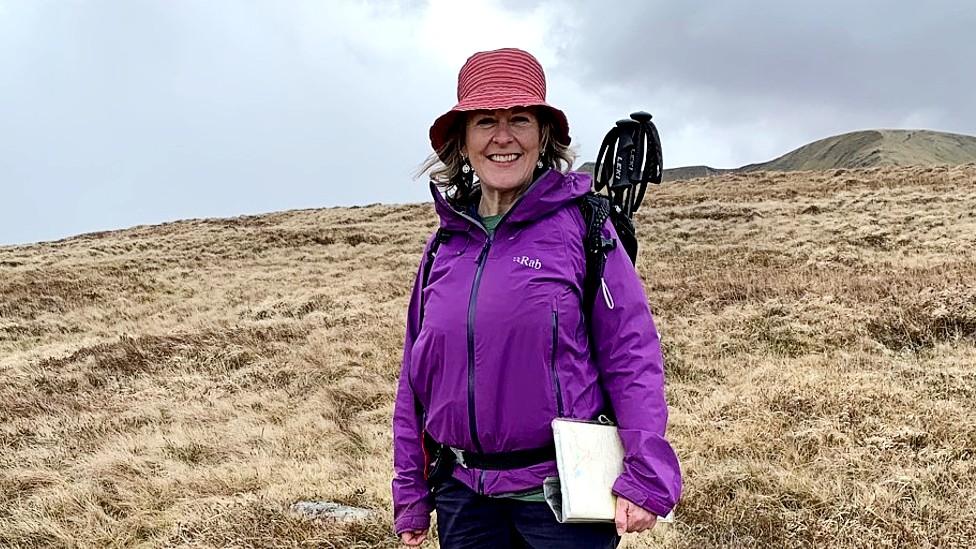
Catherine Povey wants to improve disabled access in the outdoors but preserve wildness as well
Some of the group can catch buses independently while others have private vehicles available to them, but a lack of transport adds another layer to the barriers some face.
"The biggest problem we've got is public transport actually, which is the same as for everybody," she explained.
"Today, for example, we're going on a canal walk and we're going to go by bus because we don't have a minibus and a lot of people won't have their own transport.
"But the last bus is coming back at half past three, so we've got to finish at half past three, and that's the end of it."
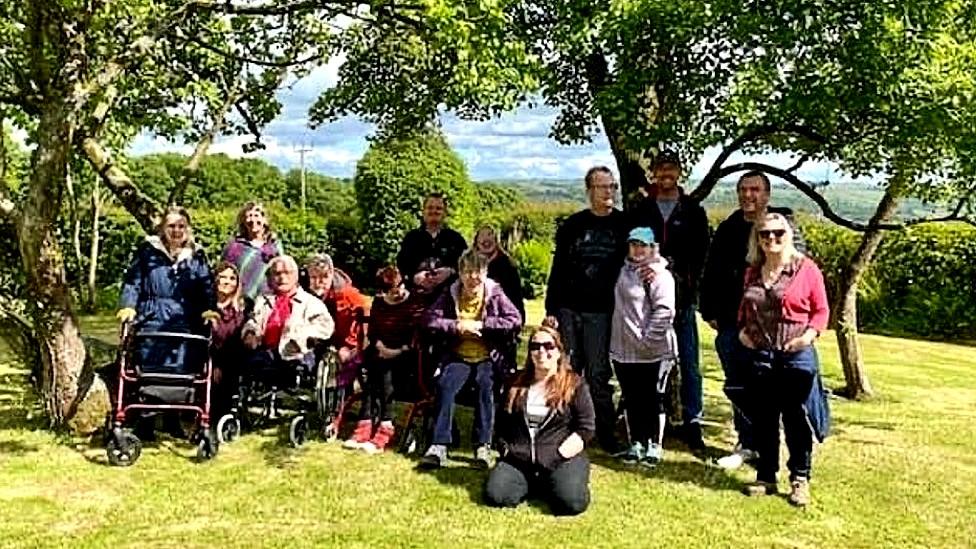
Members of the Health Lives group are "really, really keen to be outside"
Although the group is for people with learning disabilities, some of those attending will also have reduced mobility, which adds another challenge.
"We have some people in wheelchairs and some with rollators, some people who need a stick. We did a walk where we split the group into lower mobility and higher mobility, but even for those with more mobility [who went away from accessible paths], there were still stiles to get over, and some people, like the rest of us, are not as fit as they could be," she explained.
As a freelance mountain leader and outdoor pursuits leader in her a different role however, Catherine is mindful of the fact that not everywhere can be accessible.
"It is a bit of a balance. You can't make all the wild places accessible to everybody or then they are no longer wild. You can't have signposts and paths and trains going to the top of every mountain."
But she would like to see more provision, with some areas made accessible so "everyone gets the chance to experience the wild".
"Once you get up into the mountains, looking around you don't have to go up every single one, do you? You're looking around, you're in them."
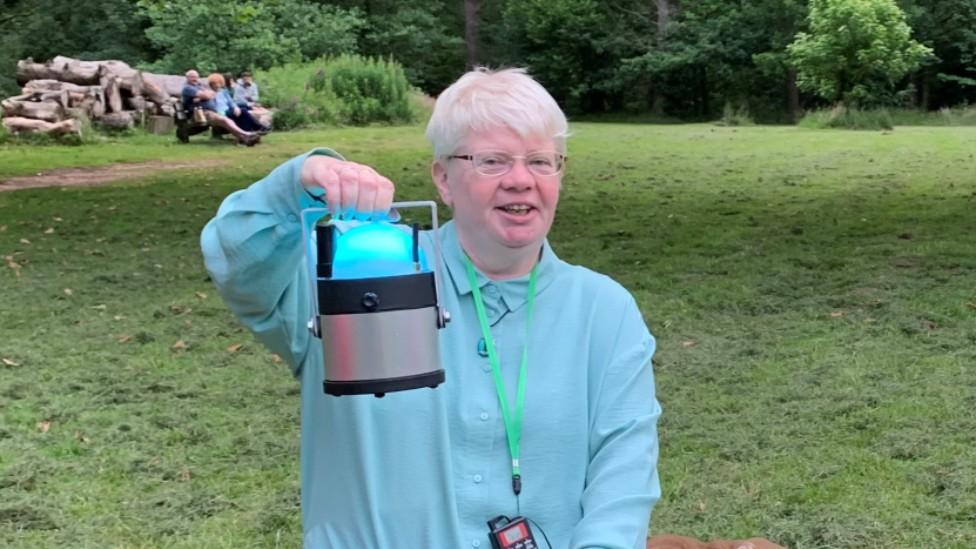
Healthy Lives member Andrea Davies took part in the Green Spaces Dark Skies project
Group member Andrea Davies, 53, has fond memories of walking and swimming in the countryside as a child with her family and getting into nature now can help bring those back.
Although she can catch the bus herself to go for walks, she said the services were not frequent enough and also thinks better wheelchair provision could help with countryside access.
Asked what she liked about being in nature, she said walking and looking at trees.
"I usually guess what trees [are which] by looking at them," she added.
"I like birds. I like whistling to them, because I don't talk tremendously."

ROYAL WELSH SHOW 2022: Visitors return to Llanelwedd after a three-year wait
IOLO: A WILD LIFE: Iolo delves into the archives from the past 25 years

Related topics
- Published27 December 2021
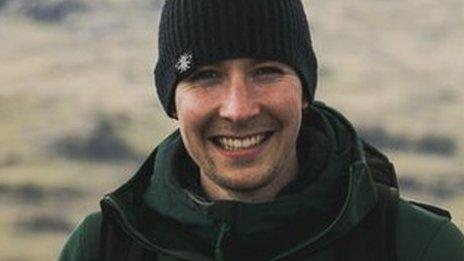
- Published1 March 2017
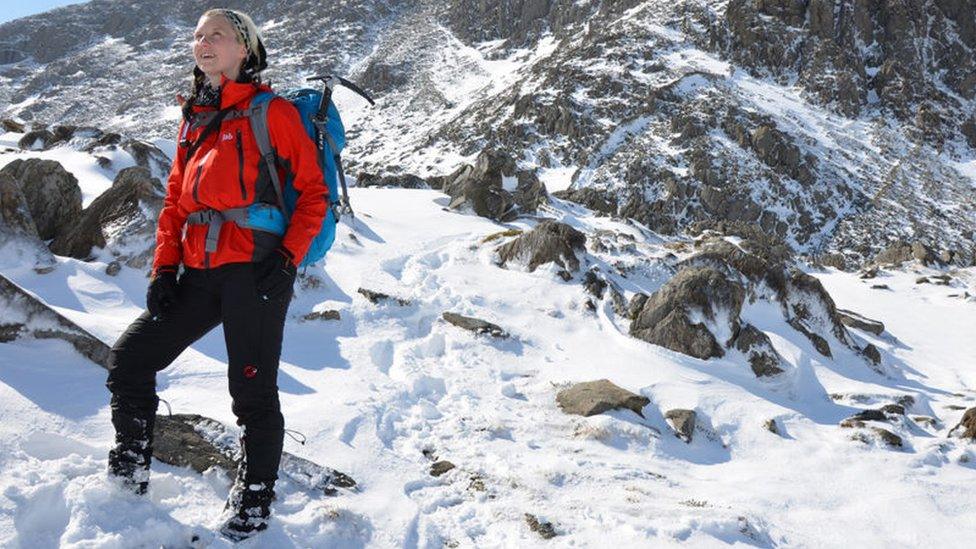
- Published13 August 2021
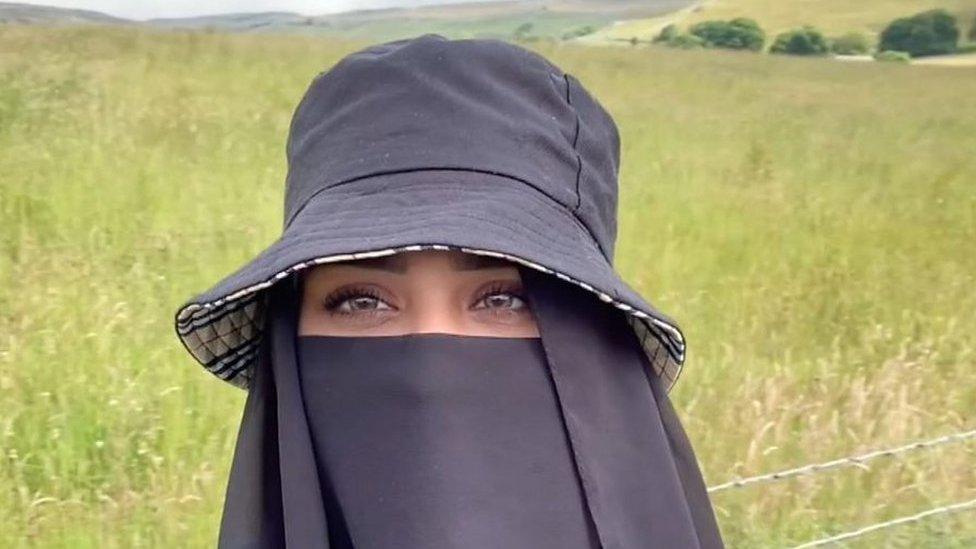
- Published13 August 2021